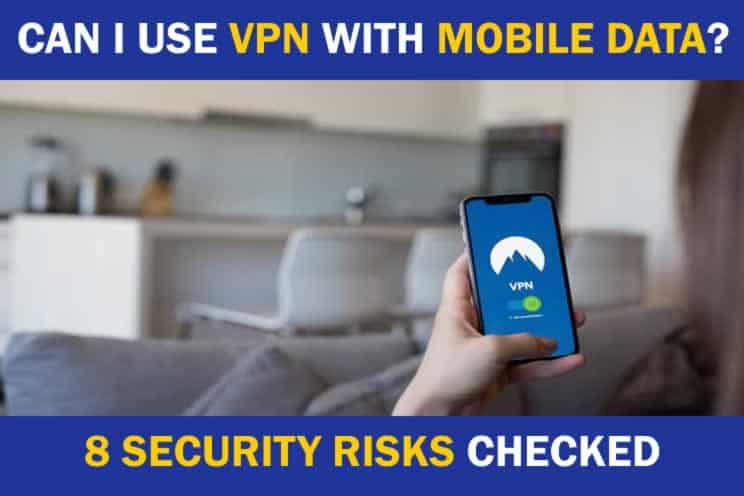
Whether you are trying to access a network in a different region or use a general Wi-Fi, it is important to keep your device and personal information secure. A VPN is what helps with this, but there is always the potential for security risks as there are multiple options of this product to purchase.
Can I use VPN with Mobile Data? 8 Security Risks to Check. Yes, there are security risks that you need to check for before going to use a VPN with your mobile data. Before using a VPN, it is important to become familiar with the security risks. Some of these risks include data leaks, malware infections, and DDoS attacks.
There are many beneficial reasons why you would want to have a VPN on your mobile phone. With this, each one has security risks that should be looked into. It is important to also know what security risks you need to look out for when using a VPN with your mobile data and ways to avoid them.
8 Security Risks when Using your VPN with Mobile Data
With every add-on and extension that you may use for the internet on your mobile phone, there are going to be risks that are associated with it. There are numerous options for VPNs to choose from (check out my list of reputable VPNs here), and some are going to be more secure than others. Here are some examples of risks you could run into if you are using a VPN that does not hold security as a priority.
Logging Policies
One of the reasons why you have a VPN is to block others from accessing your browsing histories. But there are certain VPN providers available that will log all of your browsing activities. This means that you will not have control over your private information because the provider you are using is putting that information on their own log.
The logging of policies can come in harmful ways, such as mentioned above, where all your private information is accessible, or it can come in a seemingly less harmful way. For example, a VPN provider could just be logging each time you are using the VPN to connect. This is still a breach of your privacy.
Data Leaks
Using a VPN is supposed to prevent your information from being leaked to unknown places and people, but with some VPN providers, data leaks can happen. These data leaks can occur if the VPN provider has not configured their product connection correctly. Or a leak can happen due to a browser-related issue. No matter how a leak can occur, it is still up to your VPN provider to have safeguards in place in order to prevent this from happening.
Misleading Privacy Policies
With every product you go to purchase, there are privacy policies that you have to agree to before you can use it. Many of these policies are extensive and contain numerous amounts of small print. When it comes to VPNs, it is suggested that you read these privacy policies before agreeing.
Hidden in them could be mention of the subtle practice of logging your information or the potential for sharing your information with other sites.
You will generally find this type of security risk if you are using a free VPN service. Their privacy policies will be long and have hidden ways to breach your privacy in them. One of the main reasons why they do this is so they can make money their own way. They will gather your personal information and then sell it to advertisers.
Malware Infections
Malware is a type of malicious software that was designed to gain unauthorized access to computers or mobile phones and infect them. Malware is generally used to steal personal and financial information.
Your device has the potential to get a malware infection when you download a certain VPN. The infection will spy on all your activities and collect your personal data to be shared elsewhere.
Worms
Worms are a type of virus that is easily spread from computer to computer or mobile to mobile. They can quickly replicate in order to infect the nearest mobile through their network. It generally only takes one infected mobile phone to pass along the worm to another phone.
This can even be done when that mobile phone is using a secure VPN connection. Worms can infect networks in the matter it takes for you to use your VPN to open and receive an infected email and then use your same VPN to log onto your work email. By doing so, your work network has now received a worm, and the entire thing is infected.
Being Forced to Use PPTP
PPTP stands for point-to-point tunneling protocol and is used to ensure that the communication process from the VPN user to the VPN server is being handled properly. PPTP seems like it would be the safe and right way to go, but many years ago, the NSA found a way to hack into this protocol to monitor and receive its information.
This means that cybercriminal hackers are able to do the same. Since then, there have been safe and more secure protocols that VPN servers can put into place. So instead of using a VPN that has PPTP protocols, look for ones that use IKEv2 or OpenVPN.
DDoS Attacks
DDoS stands for distributed denial of service attack, and this occurs when multiple requests are sent to a server at one time. This will then proceed to overload the server. Once this happens there, a slip in security could happen because the VPN software is attacked with so many requests that it completely shuts down and made unavailable with your personal information already entered in it.
No Extra Security Features
Some features that you should look for when going to purchase a VPN are data leak protections and internet kill switches. Having the data leak protection is always a good extra precaution to have when using VPNs. An internet kill switch is a feature that will automatically stop your browsing if the VPN were to ever lose connection.
Uses for VPNs
Let’s say that you are heading to your favorite restaurant to eat. When you get there, there is a waiting list. So, you sit down and log on to their Wi-Fi. The restaurant is busy, so it is likely that a majority of the guests are on it.
You find that the Wi-Fi is running so slow that it would be easier just to use your data. Of course, the data is not any faster. This would be the time to use your VPN because it will help you to connect to the network faster, without having to solely rely on your mobile data.
VPNs may seem like a simple tool, but they are equipped to do many different things. Below are just a few of the ways that VPNs can be used.
- Access a Business Network While Traveling: Many jobs and careers now require for some of their employees to travel for business. While traveling, these employees will need to have access to their business, and a VPN will allow them to do that in a safe and secure way.
- Block your Browsing Activity from your Local Network: When you are on a local Wi-Fi, your browsing history and current activity can be found by someone if they know how and where to look. This can be dangerous because then your information could be shared with sites and people without your consent. A VPN will help to prevent this from happening.
- Bypass Internet Censorship: If you happen to be in a place where the internet is constantly watched and censored, you can use a VPN to get around those blocks. This may be a less likely reason for why you are using a VPN because there are not a lot of places where the internet is censored.

